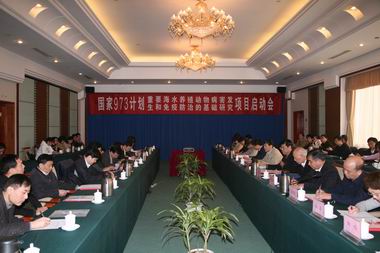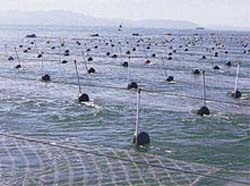

With the support of the national Basic Research Program, a research consortium led by XIANG Jianhai from the CAS Institute of Oceanology has carried out studies on the disease outbreak & immunological control of commercially important organisms in mariculture. The kick-off meeting was held on Dec. 9 and 10 in Qingdao.
The diseases occurrence has seriously hindered the healthy and sustainable development of China's mari-culture industry, the largest one in the world, causing economic losses over one million yuan each year. In addition, drug abuse has led to problems of food safety such as drug residue, the rise of drug resistance of the pathological bacteria, and deteriorating ecological environment.
In a bid to curb the pestilence's outbreak, and introduce methods for an immunological control, it is of a critical and urgent importance to carry out basic research into the disease occurrence and immunological control for promoting the healthy growth of the mariculture, ensuring the food safety, raising the public health level, bolstering the country's fisheries and innovations of China's aquatic science.
The 30-million-yuan project will focus on the following three topics over the next five years:
1. The molecular basis for the pathogenicity and epidemiological tendency, including the pathogen's molecular foundation, its interaction with the host in the contagious process and molecular basis of the pestilence's propagation.
2. The immune systems of hosts and their anti-infective mechanisms, including the mechanisms for pathogen-recognition and for the transfer and regulation of the immune signals, and its molecular basis for the anti-infection and elimination of the pathogens.
3. Technical principles and effective routes of immunological prevention, including the screening and preparation of the immunological active substances, their working mechanism and assessment of their efficacy, effective carriers and delivery routes, basis and tests for vaccinated immunology of the special host's populations
The research project is expected to promote the development in such academic disciplines as pathological genomics on aquatic animals, molecular epidemiology and molecular or cellular immunology. It could take the lead in guiding the future control of China's aquatic farming pests and their immunotherapy. Its success will be conducive to the establishment of a complete theoretical framework on the pest outbreaks and their prevention in aquatic farms, including a group of original results of international renown, upgrading China's status in the international community against hydrophile pests. Furthermore, it will play a constructive role in providing effective methods and routes against the most devastating aquatic pestilence so as to promote the healthy and sustainable development of the whole occupation.






